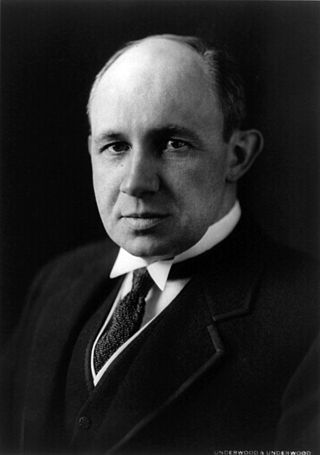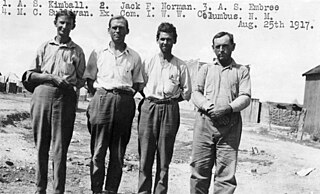
John Llewellyn Lewis was an American leader of organized labor who served as president of the United Mine Workers of America (UMW) from 1920 to 1960. A major player in the history of coal mining, he was the driving force behind the founding of the Congress of Industrial Organizations (CIO), which established the United Steel Workers of America and helped organize millions of other industrial workers in the 1930s, during the Great Depression. After resigning as head of the CIO in 1941, thus keeping his promise of resignation if President Franklin Delano Roosevelt won the 1940 election against Wendell Willkie, Lewis took the United Mine Workers out of the CIO in 1942 and in 1944 took the union into the American Federation of Labor (AFL).
Industrial unionism is a trade union organising method through which all workers in the same industry are organized into the same union, regardless of skill or trade, thus giving workers in one industry, or in all industries, more leverage in bargaining and in strike situations.

The American Federation of Labor was a national federation of labor unions in the United States that continues today as the AFL–CIO. It was founded in Columbus, Ohio, in 1886 by an alliance of craft unions eager to provide mutual support and disappointed in the Knights of Labor. Samuel Gompers was elected the full-time president at its founding convention and was re-elected every year except one until his death in 1924. He became the major spokesperson for the union movement.

The nature and power of organized labor in the United States is the outcome of historical tensions among counter-acting forces involving workplace rights, wages, working hours, political expression, labor laws, and other working conditions. Organized unions and their umbrella labor federations such as the AFL–CIO and citywide federations have competed, evolved, merged, and split against a backdrop of changing values and priorities, and periodic federal government intervention.
Labour history or labor history is a sub-discipline of social history which specialises on the history of the working classes and the labour movement. Labour historians may concern themselves with issues of gender, race, ethnicity, and other factors besides class but chiefly focus on urban or industrial societies which distinguishes it from rural history.

The Professional Air Traffic Controllers Organization or PATCO was a United States trade union that operated from 1968 until its decertification in 1981 following an illegal strike that was broken by the Reagan administration.
A sit-down strike is a labour strike and a form of civil disobedience in which an organized group of workers, usually employed at factories or other centralized locations, take unauthorized or illegal possession of the workplace by "sitting down" at their stations.
These are References for Labor unions in the United States.

Edward Boyce was president of the Western Federation of Miners, a radical American labor organizer, socialist and hard rock mine owner.
The Steel Workers Organizing Committee (SWOC) was one of two precursor labor organizations to the United Steelworkers. It was formed by the CIO on June 7, 1936. It disbanded in 1942 to become the United Steel Workers of America. The Steel Labor was the official paper of SWOC.
David Brody is an American historian, who is professor emeritus of history at the University of California-Davis.
Melvyn Dubofsky is professor emeritus of history and sociology, and a well-known labor historian. He is Bartle Distinguished Professor of History and Sociology at the Binghamton University.

The American Labor Union (ALU) was a radical labor organization launched as the Western Labor Union (WLU) in 1898. The organization was established by the Western Federation of Miners (WFM) in an effort to build a federation of trade unions in the aftermath of the failed Leadville Miners' Strike of 1896. The group changed its name from WLU to the more familiar ALU moniker in 1902 at its fifth annual convention. The group had a peak membership of about 43,000 — of which 27,000 were members of the WFM. The ALU was a precursor to the Industrial Workers of the World (IWW), established in 1905, which effectively terminated it.
Richard Schneirov is a professor of history and noted labor historian at Indiana State University.
The Solidarity Day marches were a pair of large political rallies in support of organized labor that took place in Washington, D.C. on September 19, 1981 and August 31, 1991. Approximately 250,000–500,000 people took part in each march.

Donald Randall Richberg was an American attorney, civil servant, and author who was one of President Franklin D. Roosevelt's key aides and who played a critical role in the New Deal. He co-wrote the National Industrial Recovery Act, was general counsel and executive director of the National Recovery Administration. He also co-authored the Railway Labor Act, the Norris-LaGuardia Act, and the Taft-Hartley Act.
The Industrial Workers of the World (IWW) is a union of wage workers which was formed in Chicago in 1905. The IWW experienced a number of divisions and splits during its early history.
Solidarity was a newspaper published by the Industrial Workers of the World from 1909 to 1917. It was the official periodical of the organization in its early years. It was born as part of the McKees Rocks strike in 1909, initially by the IWW's Pittsburgh-New Castle Industrial Council. During the IWW's involvement in the local steel industry in New Castle and in Butler, Pennsylvania, the entire editorial and production staff of Solidarity was jailed.

A. S. Embree was an American union organizer, Christian minister, and, leader in the Industrial Workers of the World (IWW). Embree served as the secretary-treasurer pro-tem of the national IWW for a period of two months after the national office was raided by federal agents.







